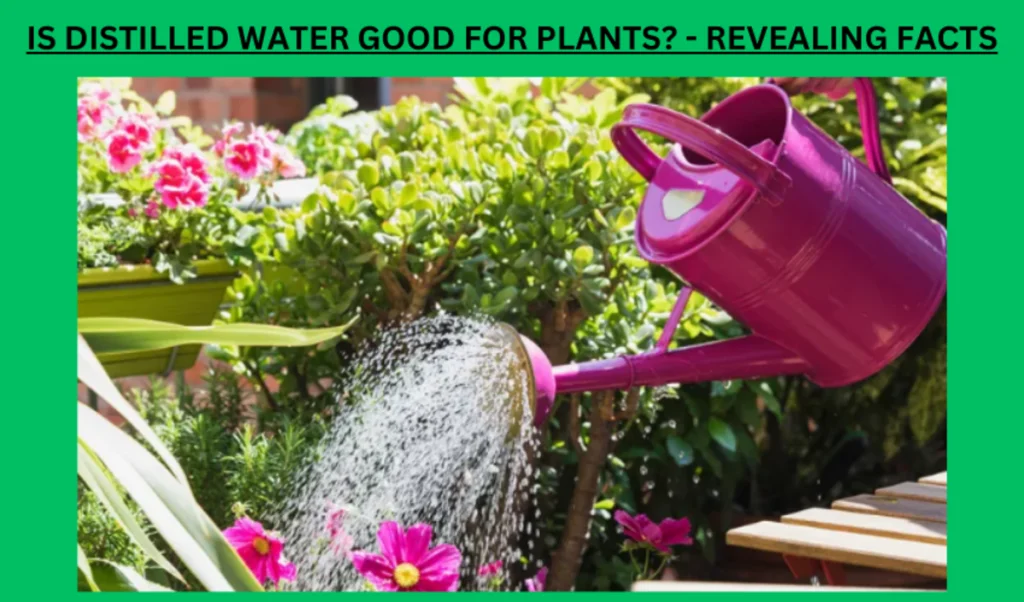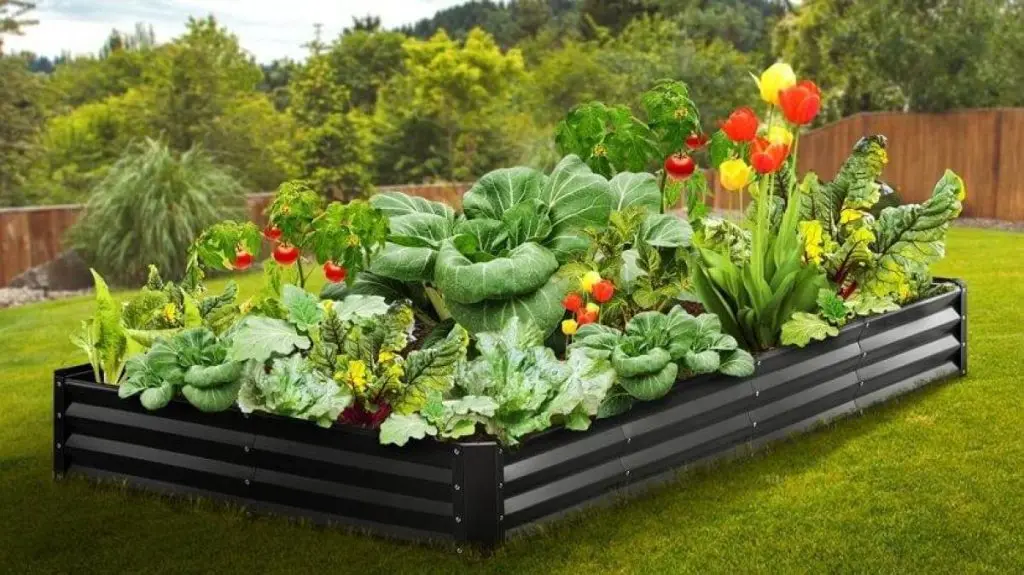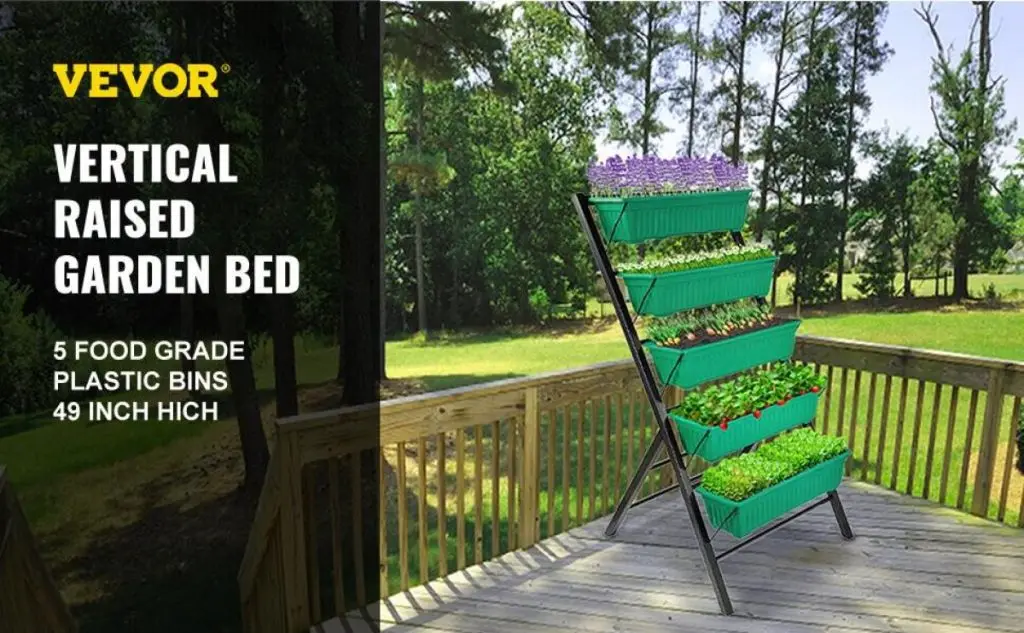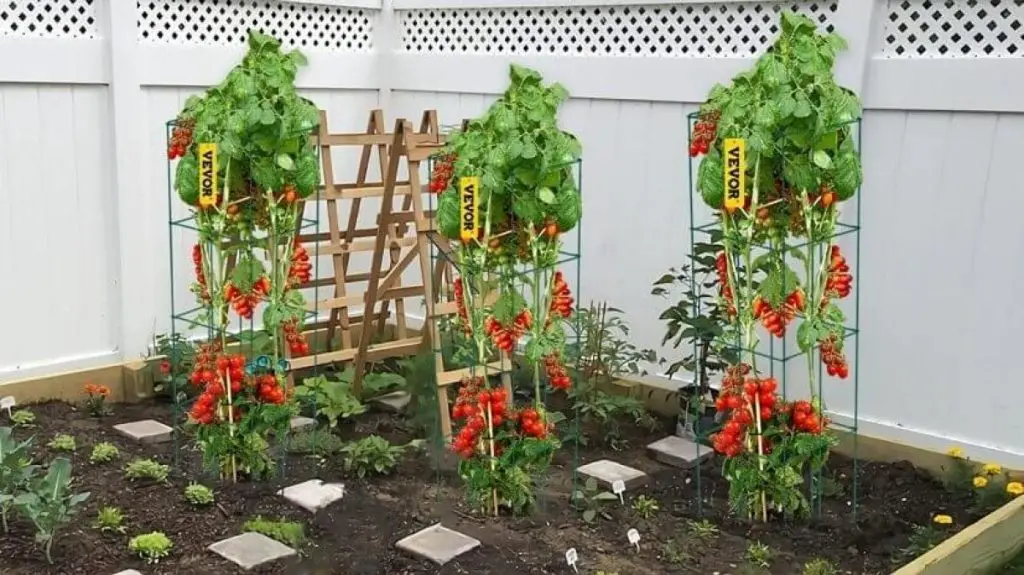Introduction
Do you wonder how distilled water does affect plant growth? You’re not alone. Lots of gardeners encounter this problem. Water is a pillar of plant life since it is used to absorb nutrients and for photosynthesis. Yet, amidst the many watering options, the question arises: Is distilled water good for plants? This debate aims to untie the truth. We will escort you through the complexities, making sure that both sides of the coin are weighed. The question “What is the most suitable watering technique for your plants” is probably familiar to you. At the end of this article, you will learn a lot about the mysterious role of distilled water in plant care.
Table of contents
Understanding Distilled Water
Concerned about what is a water distiller? The water that goes through the process of distillation, that is, boiling to make steam followed by cooling and condensing back into liquid form, refers to distilled water. Hence, this method effectively removes impurities, minerals, and contaminants left with a pure form of water with a neutral PH.
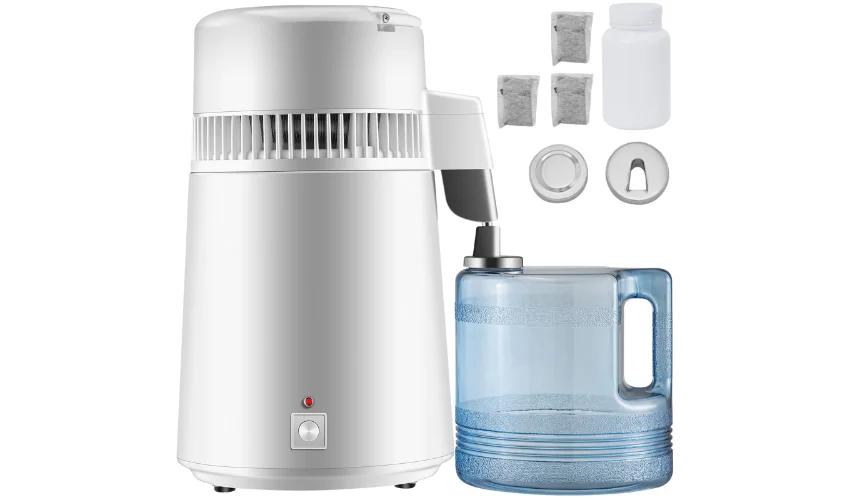
Advantages of Distilled Water for Plants
Multiple benefits exist regarding “Is distilled water good for plants”. The key ones are:
Controlled pH:
Distilled water typically has a neutral pH, thus making it neither acidic nor alkaline. This controlled pH level provides a stable environment to the roots of the plants which can accordingly absorb the necessary water and essential nutrients without any change in acidity of the soil.
Reduced Salinity:
Salinity plays a key role in deciding “Is distilled water good for plants”. The main feature of distilled water is the lack of salts and minerals, which gives it low salinity. These lowered salt levels prevent the accumulation of salt, which can harm plants.
Prevention of Mineral Buildup:
The demineralization of water through distillation eliminates mineral deposits in the surrounding plants’ roots and the soil. The accumulation of pollutants, therefore, impedes the water and nutrient uptake in the plants, and the deficiency creates a dwarf-like situation for the plants.
Precision in Nutrient Management:
With distilled water, controlling the nutrition of plants much more specifically is possible. Since distilled water lacks minerals, you can adjust your nutrient solution based on the distinct nutrient requirements of each plant without minerals in the water getting in the way of the process.
Reduced Risk of Contaminants:
Distillation effectively removes heavy metals, chlorine, and other pollutants from water so that all the clean water will be supplied to your plants. This prevents the development of toxicity in the soil and minimizes the risk of plant harm or pollution.
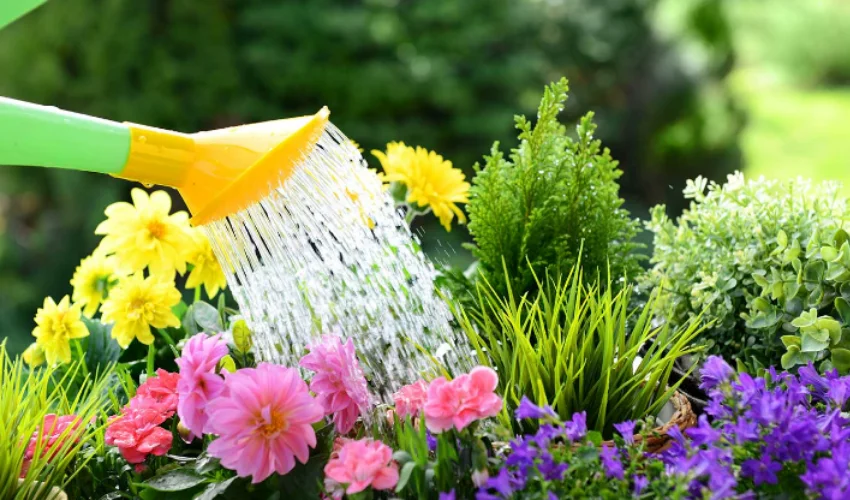
Consistency:
Distilled water ensures your plants have a constant and uniform water supply devoid of changes in the level of minerals or pH. This consistency provides great predictability in plant growth and development, as their environment is under control.
Suitability for Sensitive Plants:
Yes, it is right concerning “Is distilled water good for plants”, distilled water is good for plants. Without minerals and impurities, distilled water is less prone to leave residues on plant leaves, pots, or other surfaces. This aesthetic benefit will enhance the overall look of your garden and will keep the plants clean and healthy.
After reading the above plus points, now you have insights on the “Is distilled water good for plants”. Please note there are also some cons. Head to the section below for insights.
Drawbacks of Distilled Water for Plants
Besides the benefits, there are also some cons to the idea that “distilled water is good for plants” exists. Get insights on them in the following section:
Lack of Minerals:
The distillation process provides one of the main drawbacks: the water delivered at the end is deficient in minerals vital for plants to foster their proper growth. With such minerals nearly absent, the plants could suffer from nutrient shortfallings that might lead to growth stunting, yellowing leaves, and probable dying.
Acidification of Soil:
Lack of alkaline minerals present in distilled water can catalyze the process of soil acidification over time. Such an acidic environment can disturb the development of some plants and soil microorganisms important in fertility and soil health.
Leaching of Soil Nutrients:
The pureness of distilled water can also cause the removal of the existing nutrients from the soil. Without the bonds of minerals, water can wash away beneficial nutrients from the root zone, thereby losing soil fertility and compromising plant nutrition.
Cost and Environmental Impact:
It takes significant energy and resources to make distilled water, placing it higher on the scale of costs and environmental impact than untreated tap water. Besides, the disposal of distillation wastewater is also an environmental challenge.
Potential for Altered Soil pH:
Regular application of distilled water with its neutral pH will possibly lead to a shift in soil natural pH balance, especially in acidic soil. This creation of optimum pH conditions may inhibit the uptake of essential nutrients and microbial activity essential for plant growth and soil health.
Lower Activity of Microbes:
Microbes are no longer present in distilled water and are responsible for soil fertility and nutrient cycling as well as for suppressing diseases. On the contrary, soil microbial function will likely decrease so that the soil health and plant growth will be affected as well.
High Impact On Tolerance:
Plants that have become used to tap water may also have become resistant to some minerals or contaminants that may be present in the water. Replacements of tap water with distilled water may at once place plants under stress leading to poor growth and weak stature.
In the above cons the answer to “Is distilled water good for plants” is simple and straight no.
Comparison with other types of water
Want to know more on “Is distilled water good for plants” get insights on the differences between distilled water and the other types of water in the following section:
Tap Water:
Tap water can be conveniently attained and has minerals such as calcium and magnesium needed for plant health. On the other hand, it might include chlorine and other damaging chemicals to plants, particularly delicate ones.
Purified Water:
Afterward, it should get strained, such as minerals and various contaminants, which harm health. Unlike tap water, it lacks all the nutrients. Still, it is safe and the best option, especially for plants sensitive to inorganic minerals and other chemicals in tap water.
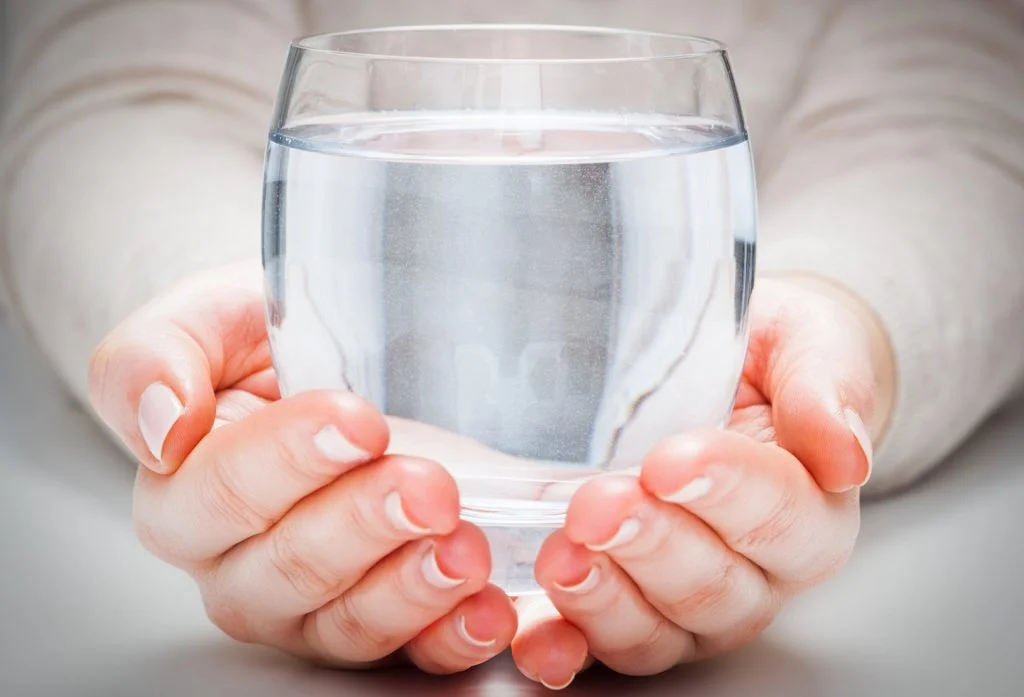
Spring Water:
The main spring water source is natural springs, which may include beneficial minerals for plants. It is always free from harmful chemicals. Therefore, it is suitable for watering your plants.
Distilled Water:
Distilled water, in its pure form, lacks minerals and contaminants, which can provide a minimally safer option for irrigation. Suppose mineral deficiency is the only thing that prevents a plant from thriving. In that case, the hydroponic method is an excellent option to avoid it, especially for areas with high mineral content in the soil.
Mineral Water:
Mineral water has different minerals that plants get in small quantities. Too many minerals may form a salt layer on the soil, negatively affecting plants’ vitality.
Plant Watering Requirements
Water is a prerequisite for plants’ growth, providing them with the required roles. It acts as a medium for assimilating and translocating nutrients within the plant. With insufficient water, plants become weak, causing a decline in health and growth. But the following section emphasizes more on “Is distilled water good for plants” in a detailed manner.
What Plant Situations Need to Be Watered Using Distilled Water?
You can feel free to give distilled water to plants in the following conditions:
- Sensitive Plants: Some species of plants are very much dependent on the mineral content and pollutants in the common tap water. Such plants are mainly orchid species, ferns and bonsai trees.
- Salt-Sensitive Plants: Vulnerable plants, like ferns and certain types of palms, are aided by distilled water since distilled water does not contain salt -buildup in the soil.
- Hydroponic Systems: Hydroponics tend to use a closely regulated nutrient solution. Distilled water allows the ratio of nutrients to stay constant without being disturbed by unwanted minerals.
- Seedlings and Cuttings: Sensible maiden plants are vulnerable to mineral toxicity. By applying the distilled water at the start of the growth, damage is eliminated, and it guarantees healthy growth.
- Sensitive Environments: Plants grown in situations with bad water quality, like places with high concentrations of minerals or pollutants, will likely benefit more if distilled water is used to prevent them from suffering.
Optimal Water Quality Requirement for Plants
Please note that for good plant growth, the key water quality requirements include:
- pH: pH greatly affects the growth of the plant. To experience effective growth you need a pH of water between 6.0 to 7.0.
- DO: It is essential that the level of oxygen supply in water makes roots healthier and facilitates the restoration of nutrients. Root rot may strike due to a lack of oxygen.
- Chlorine and Chloramine: Chlorine and chloramine in tap water damage friendly microbes in the soil as they hamper plant growth. Correct filtration or letting tap water sit for a day helps disperse the chemicals.
- Temperature: Plants’ metabolism and root function are affected by water temperature. The ideal water temperature is close to ambient or slightly above to not shock the plant roots.
- Heavy Metals and Contaminants: Toxins such as lead, arsenic, and mercury harm plant health and human consumption if they are in water. Frequent testing and the effective application of filtration procedures are indispensable for water security.
- Nutrient Levels: Plants need particular nutrients for optimal development along with necessary mineral components. Observing nutrient levels of water and making adjustments required gives plants all the elements they need to thrive.
Effects of Distilled Water on Plants
Uncover information on the impact of the distilled water on plants in the following section:
A. Nutrient Availability:
The distillation process removes the minerals that plants need for their growth. The plants may also find it hard to take in necessary nutrients when you water them with distilled water. This deficiency might slow down their growth or even cause the yellowing of leaves. Plants may not fare as well as expected without mineral elements like calcium, magnesium, or potassium.
B. pH Levels:
Usually, distilled water has a neutral pH that may upset the pH of the soil. Using distilled water in the long run leads to more acidic soil. This acidic environment might influence plant health, as some plants grow better in slightly acidic or alkaline soil.
C. Potential Toxicity:
The deficiency of minerals in distilled water results in the buildup of the salts in your soil. This accumulation can lead to both nutrient deficiency and toxicities in your plants. Soil with unbalanced mineral levels may affect their growth and whole health.
D. Impact on Soil Microorganisms
Distilled water may disrupt balanced microorganisms in your soil. These microbes are the most important organisms for maintaining the soil’s health and nutrient cycles. If you exclusively use distilled water, you might damage these beneficial organisms, contributing to natural soil fertility.
Best Water Distiller Products For Quick and Efficient Water Purification
Curious about the best-in-class and well-qualified water distillers in the market? Uncover key ones below:
VEVOR 0.3G/H Water Distiller
On the horizon, you see the VEVOR 1.1 Gal Water Distiller, which will always deliver pure water at your service. Fitted with a 0.3-gallon tank capable of holding water for one hour and a 750-watt heating element for effective water disinfection.
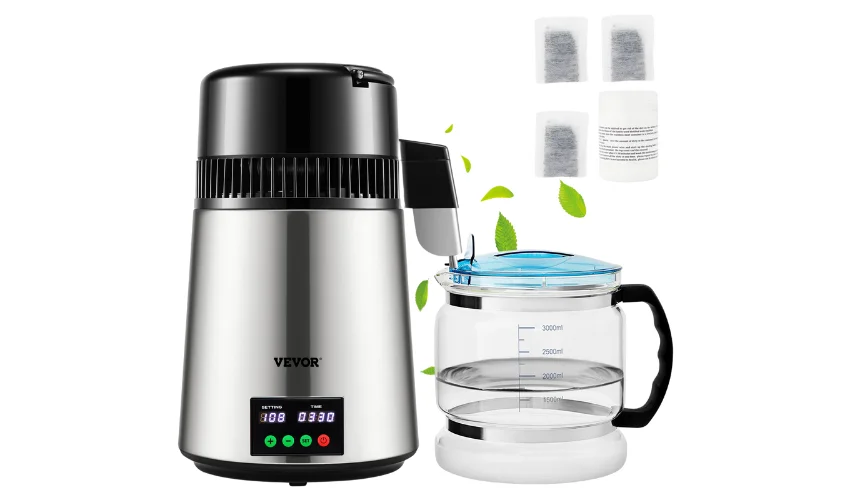
Efficient Water Purification:
The portable home water distiller produced by VEVOR, which produces 750W of water and one liter per hour, removes solids and contaminants for clean drinking water. It can make alcohol and essential oils while being suitable for different settings.
Upgraded Timing Function:
The distiller has a timed function that allows the fermentation to be maintained at a constant temperature (0-99 H). Set it up to 3.5 hours for 1.1 Gal (4 L) to suppress the limescale desired for alcohol and oil production.
Precise Temperature Display:
The temperature reading on the controller is from 30℃ to 108℃ for more precise distillation. This technology switches the dry burning off at 115C or 150C.
User-Friendly Accessories:
It comprises cleaning agents and carbon packs. Easy tank cleaning. Water left after distillation never results in limescale deposits. Carbon pack enhances water flavor.
VEVOR 1.5L/H Water Distiller
We greet you on the VEVOR 4L Water Distiller. This water purifier can be trusted because it filters the distilled water. This distiller has a one-liter-per-hour capacity, timer function and dual-temperature indicator. You can count on this one to provide pure and clean water for multiple uses, and the shiny silver design also looks great.
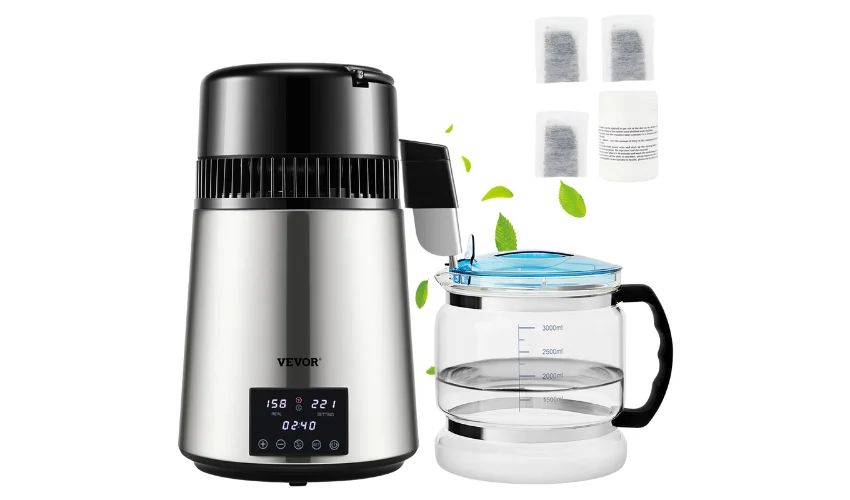
Faster Water Purification:
The VEVOR home water distiller, at a production capacity of 0.4 Gal (1.5 L) per hour and 9.5 Gal (36 L) per day, can efficiently remove solids, VOCs, and impurities widely used in residential and industrial applications.
Upgraded Timing Function:
It has a 0-99 heating feature that provides constant temperature and works well with alcohol, base oil, and hydrosol. Limescale is significantly reduced by placing water at the bottom. “
Two Displays For Temperature:
Measures both ambient and actual temperatures (86°F to 226.4°F). The function of the ℉/℃ button is for easy tracking. Dry-burn prevention just switches off at 239℉ (115℃) and 302℉ (150℃).
Quick Dissipation of Heat:
Made from food-grade 304 stainless steel, it guarantees safety. The glass carafe, combined with the silicone buffer, is an attempt to provide long-term durability. Efficient heat dissipation is achieved thanks to the 4-blade aluminum fan and SUS 304 condensing coil. For cleaning instructions on the water distiller, read this.
FAQs
Some of the frequently asked questions on “Is distilled water good for plants?” are as follows:
Is distilled water beneficial for all plants?
Distilled water does not contain the minerals required for plant development and, in turn, can affect different plants differently. Although hardy plants may handle it, susceptible plants may be damaged anyway. Think about the needs of your plant before using distilled water.
How Distilled Water Influence Plant Growth?
A deficiency of the essential minerals can make your plant unhealthy. You can experience yellow leaves and shrubbed growth. While some plants can adapt, others may continue to struggle to survive.
Is Distilled Water Safe for the Hydroponic Systems?
The answer to “Is distilled water good for plants” is yes. But with caution. Hydroponic systems are based on carefully crafted nutrient solutions. Utilization of only distilled water leads to the requirement of more supplements to cater to the needs of optimal growth.
Do you know how to make your own distilled water for plants?
Yes, by boiling water and using the steam. Though this approach needs time and apparatus, it may not be feasible for everyone.
What Are the Distinctions Between Distilled Water and Other Forms of Water for Plants?
Tap water usually contains elements necessary for plant growth but might also contain dangerous chemicals. Rainwater is distilled but could be polluted. The mineral content in bottled water is different. Choose the best option depending on your plants’ needs and water quality.
What are the proper ways to apply distilled water to indoor plants?
Use distilled water alternatively or in combination with other types of water. Keep track of the plants’ health and change the watering strategies as required. Avoid overwatering and give extra minerals as necessary to boost the growth.
Conclusion
Now that you have looked at the revelations on “Is Distilled Water Good For Plants?”, you can see that there is the correct water distiller that can bring your gardening game to the top level. Distilling water eliminates all impurities, which is the best way for plants to be hydrated. Keep in mind that plant growth and well-being are heavily dependent on the quality of water. For effective action, purchase VEVOR products, as we have reliable water distillers. We offer you a wide selection to pick the most appropriate one so your plants get the most pure water possible. Power up your gardening adventure now by making a wise choice with VEVOR. Your plants will show gratitude!

